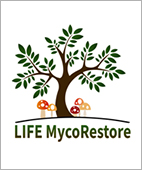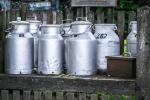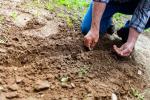
LIFE Project: Innovative use of mycological resources for resilient and productive Mediterranean forests threatened by climate change
- Type Project
- Status Filled
- Execution 2019 -2023
- Assigned Budget 3.045.717,00 €
- Scope Europeo
- Autonomous community Madrid, Comunidad de
- Main source of financing LIFE
- Project website Web del proyecto
LIFE MycoRestore aims to use diverse mycological resources and forest management practices to contribute to the biological resilience of Mediterranean forests.
Mediterranean forests are currently facing severe abiotic and biotic stressors. The most common is drought. Climate change models predict that the Mediterranean will be exposed to more frequent and severe droughts, which in turn can exacerbate forest fires.
Forests are also affected by biotic stressors, including various pests and pathogens that weaken and kill forest flora, jeopardizing the health of the entire forest ecosystem. These Mediterranean forests serve as biodiversity refuges and important carbon sinks. Fungi are a fundamental pillar of biodiversity, both underground (mycelia) and aboveground (mushrooms). They support numerous ecosystem services and can serve as a crucial tool for forests to adapt to climate change.
- Demonstrate sustainable mycological and forest management practices to increase forest resilience to fire and drought (MycoForestry).
- Promote green jobs in rural economies based on wood processing and innovative, high-value mushroom-based products. The project demonstrated a circular economy approach to mushroom and substrate production supply chains (MycoEconomy).
- To provide proof of concept on the use of natural mycobacterial control products and native fungal species to reduce the presence of pests/pathogens in forests (MycoControl).
- Successful mycorrhizal inoculation at demonstration sites (235.5 ha).
- Successful isolation and testing of native biocontrol fungi.
- An adequate pH level was achieved and maintained in the soil thanks to the application of calcium carbonate. This correction led to good development of the mycelium of the ectomycorrhizal fungi and also served as an antagonism against the phytopathogenic oomycete Phytophthora cinnamomi, since the calcium ion hinders its growth.
- Biodiversity boxes promoted natural pest control.
- The combined strategies implemented in the Mycorestore project significantly improved tree health, with an average improvement of 32% in diseased trees.
- Limestone amendments improved truffle mycelium growth.
- Successful isolation and testing of native biocontrol fungi.
- Production of medicinal mushrooms, in this case turkey tail (Trametes versicolor), on the remains of silvicultural treatments to prevent the spread of chestnut blight. This demonstrates a new source of income through the production of non-timber forest products with high economic and environmental value (since no energy is expended in their production).
- Training and skills development for forestry workers. Many of the trained foresters earned their European chainsaw certification and will continue to expand their acquired knowledge to create jobs and new projects in forest areas across Europe.
- Promising prospects for sustainable forestry practices.
- Integrating substrate-mushroom production for sustainability.
- Biochar has great potential for value-added compost production, soil improvement, and several other applications.
- Potential for replication and knowledge sharing around circular forestry practices.
- Coordinator/entity name: Álvaro Peix
Postal address: C/ Serrano 117, 28006, Madrid
- Agencia Estatal Consejo Superior De Investigaciones Cientificas
- IPSP-CNR(Consiglio Nazionale Delle Ricerche Istituto Per La Protezione Sostenibile Delle Piante)
- CERDEIRA(Colquida, Lda)
- IDFOREST(Biotecnología Forestal Aplicada S.L.)
- VOLTERRA(Volterra Ecosystems SL)
- UVA(Universidad de Valladolid)
- SOCFOREST (Socialforest S.L.)
- MYCELIO(Myco Life S.L.)
- FUNGE(FUNDACIóN GENERAL DE LA UNIVERSIDAD DE VALLADOLID)







